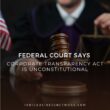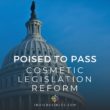[This post was originally published on my Twitwall on March 12, 2009. I think it is important for context to share it with you at this blog as well. You can see the comments on the original post beneath the post itself.]
A 32-page report (PDF) entitled “No More Toxic Tub” has been released by the Campaign For Safe Cosmetics. The report purports to show that a large number of cosmetics designed for children contain harmful ingredients. The report is undated so I'm not sure when it was released, but it seems to be quite recent. One of the things the report suggests is that federal laws should be changed to require that cosmetic ingredients and products designed for children should be proven safe through testing before the products are sold.
The report also says that “provisions should be made to support businesses, particularly small businesses, in meeting federal regulations for safer products.” While I am encouraged by this statement, its appearance at the bottom of page 22 of the 32-page report is not especially indicative of a commitment to make sure that small businesses are not regulated in the same manner as large ones.
Moreover, while the report asks people to write their Congressional representatives and alert the media about the issue, it does not encourage them to let them know that small businesses are not a part of the overall problem.
I know that some large manufacturers with billions of dollars in annual sales and millions of customers worldwide are using questionable ingredients in their products. This is a problem that the newly introduced FDA Globalization Act of 2009: HR-759 should address. However, and this is important, it is not the small, artisan, Indie and handmade companies that are using these unsafe ingredients and therefore, any new law must be carefully tailored to ensure that small companies are not regulated in the same way that larger ones are.
We Made A Difference On Capitol Hill
When I went to Capitol Hill last year with several other members of the IBN (Essential Wholesale, Bramble Berry, Bella Lucce, J.blossom), this is exactly what we urged, and we were successful in removing several troublesome provisions in the draft of the cosmetics law, including annual fees of up to $12,000. We did this in conjunction with the Handcrafted Soap Makers Guild (@soapguild). These victories were fantastic, and they help to make sure that while the public is safe, small business are not decimated.
We Must Continue To Make A Difference
We must continue the progress we began last year as we work with Congress and others to preserve a level playing field for the small businesses that are such a critical part of the American economy. We must continue to inform everyone we can about the crucial differences between the way huge multi-national cosmetics companies do business and the way Indie Beauty businesses do business.
Some people do not want the new law to pass with any kind of waiver or special consideration for Indies. I am not one of those people.
Let's Not Let History Repeat Itself
We have already seen what happened with the CPSIA, the new consumer law which requires that children's toys, clothing and other items be tested for lead before they are sold. Small companies are regulated under this new law in the same way that large companies are. This happened because the law law passed without any consideration for small businesses, many of which are no longer in business because they can't afford to test their products for ingredients they already know those products do not contain.
Let's make sure the same thing does not happen in the cosmetics arena. Cosmetics should contain safe ingredients. We all want that. But companies that are using safe ingredients should not be required to test for ingredients that they know they are not using in the first place. Requiring such pre-market testing would put thousands of small companies out of business without doing anything to protect consumers.
As manufacturers, IBN members are committed to producting quality cosmetics and to providing consumers with safe alternatives to mass marketed products.
With your help and support, I intend to continue to inform legislators, regulators, my colleagues, IBN members, consumers and all stakeholders on this important issue.
Question: What are your thoughts on the Toxic Tub report? Do you think it goes far enough to distinguish between the larger companies that may be the source of the problems complained of from the small companies that don't use the ingredients discussed in the report? Do you think it's fair?



